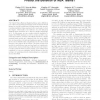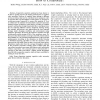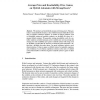148 search results - page 11 / 30 » The Contribution of Game Theory to Complex Systems |
ATAL
2010
Springer
13 years 8 months ago
2010
Springer
Multi-agent learning is a crucial method to control or find solutions for systems, in which more than one entity needs to be adaptive. In today's interconnected world, such s...
KDD
2008
ACM
14 years 8 months ago
2008
ACM
The United States National Basketball Association (NBA) is one of the most popular sports league in the world and is well known for moving a millionary betting market that uses th...
TCOM
2010
13 years 6 months ago
2010
—Cooperative spectrum sensing has been shown to be able to greatly improve the sensing performance in cognitive radio networks. However, if cognitive users belong to different se...
ATAL
2010
Springer
13 years 8 months ago
2010
Springer
We propose Path Disruption Games (PDGs), which consider collaboration between agents attempting stop an adversary from travelling from a source node to a target node in a graph. P...
FORMATS
2008
Springer
13 years 9 months ago
2008
Springer
Abstract. We introduce and study hybrid automata with strong resets. They generalize o-minimal hybrid automata, a class of hybrid automata which allows modeling of complex continuo...



